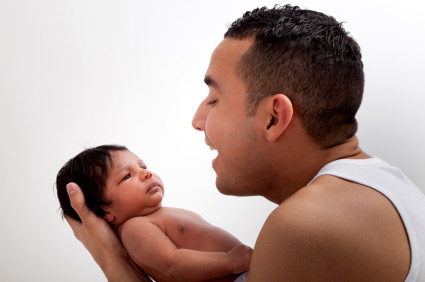Babies' Language Development from 0-6 Months

One of the most fascinating parts of infant development is language - witnessing your baby discover his or her own unique voice can be incredibly rewarding.
Language Milestones
Here are some language development
milestones that you can expect during the first six months:
First month:
-
responds to voices
-
small cooing begins
-
communicates with smiles, gazes, and crying
Second month:
-
discovers own voice
-
gurgles, coos, and squeals
-
exhibits motions
-
smiles back when smiled at
-
looks at parents' faces when they talk
Third month:
-
begins extended vowel sounds, like "ah"
-
starts to laugh
-
has different cries for different needs
Fourth month:
-
changes shape of mouth to modify sounds
-
sputters, gurgles, begins babbling
-
laughs out loud
Fifth month:
-
babbles ("ba-ba")
-
tries to mimic sounds
-
squeals and is interested in sounds others make
Sixth month:
-
longer and more varied sounds ("ga-ga, dada, papa")
-
experiments with different volumes and pitches of sounds
-
squeals with delight when happy
-
sputtering sounds with the lips and tongue
-
makes sounds or talks to toys
Babies first communicate by crying. Then they learn to make sounds and smile. This is how they "talk." Eventually they learn to use words, but even before then, communication is a two way street - talk to your baby when your baby "talks" to you.
Play and Activity
As your baby learns to talk, be sure to talk back. Comfort your child with a soothing voice and gentle words. And mimic any sounds your baby makes - this is a fun way to encourage your baby to make even more sounds.
Here are some other tips for fostering healthy language development:
- Talk to your baby using the language in which you feel most comfortable.
- Hum to your child.
- Sing nursery rhymes and songs.
- Read and tell stories to your baby, it's never too early to start.
- Play games (peek a boo, imitating sounds your baby makes, gentle tickling, shaking toys, etc.).
- Talk to your baby about what you are doing (bathing, diapering, nursing, etc.).
- Call your baby by name.
- Make sure your baby can see your face when you are speaking.
- Talk out loud about what you think your baby is trying to tell you with his coos, cries, and babbles.
Read to Your Baby
It’s never too early to read to your baby. Even newborns will benefit from listening to books. Hearing your words helps your baby develop language.
Resources & Links:
Leap BC’s guide Move with Me from Birth to Three
HealthLink BC Language Development, Ages 1 to 12 Months
-
Knowing whether or not your baby is developing on schedule is a top priority for new parents. While each baby grows and advances at his own rate, there is a range that is considered typical. If your babys development falls outside of this range, this
-
Babies go through incredible physical changes in a short time. Heres what you can expect in terms of growth and development during the first six months. Starting from birth, your healthcare provider should measure your bab
-
Your babys first and most important relationship is with you. From the day he is born, you begin bonding with him. Every touch, cuddle or kiss helps him feel secure, which leads to an attachment. According to the University of Washington, this health


